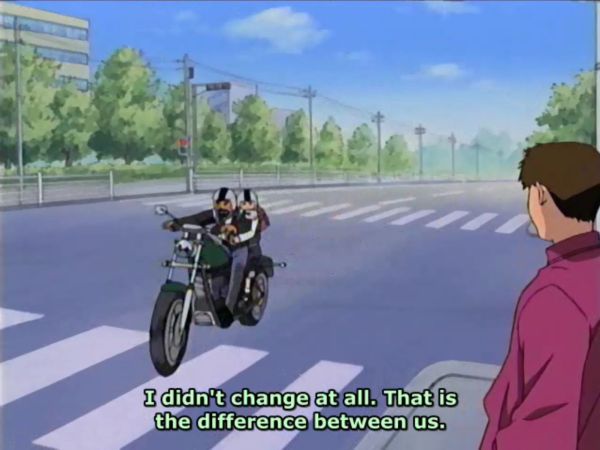
“Only the body is shed; the mind is forever in the maze of 19 lines.”
I saw this illustration near the end of the Hikaru no Go manga. It creeped me out, and I think I had reason for that.
I have written occasionally about the relevance of lower worlds – the worlds which we humans create – to the human soul. Back in the 1990es, one of my fellow ardent Daggerfall players pondered whether we might go to Daggerfall when we die. That was both a creepy and alluring prospect in a certain sense: Daggerfall was a truly life-size game, the like of which has perhaps never been seen (although the graphics are less than amazing by today’s standards). As experienced from 1st person perspective, the size of the terrain was around the size of Great Britain – more than enough to live countless lifetimes and yet not stumble across everything. It was a world rich in magic and with varied weaponry, but also ordinary clothes, houses, bookstores, even banks. It seemed reasonable, entirely too reasonable, that a game such as that could trap a human spirit.
I have mentioned the Orthodox philosopher Philip Sherrard and his conviction that the human soul, upon death, brings with it its internal representation of the world. Indeed, it is this internal image of the world which the soul lives in even while alive, although while we live it may be updated frequently through our senses. Once we die, this connection is broken, but the vast internal model of the world remains with us and the soul continues to inhabit it. As such, it seems reasonable to assume that the dead may not even know they are dead, even if they remain conscious in some non-physical medium.
Ryuho Okawa, founder of the Japanese new religion Happy Science, likewise think that dead humans without spiritual experience will quickly forget that they are dead. The Astral Realm, where such souls live, is similar to the physical world. I don’t think Okawa and Sherrard knew of each other – they don’t have much more in common – so I assume this is some tradition that has been around for a while.
It is in light of this that I see the words of today’s picture and imagine the hapless soul trapped in the Go board, unaware that its life on Earth has come to an end, endlessly searching for the Hand of God in the maze of 19×19 lines. I wonder if even Daggerfall, with its night terrors, would not be preferable to such a maze. And yet it is not really a very confined space: The number of different games that can be played on a grown-up’s goban (Go board) far exceeds the number of stars in the observable universe.
Using my imagination, I traveled to an alternate timeline in which I had started studying Go seriously in early 2010, some two and a half year ago. Spending hours each day learning the game, very little would happen at first. For months, I would just routinely lose to the artificial intelligences, being too incompetent to dare challenge a human player. I would however continue to study the newbie advice available on the Net, and eventually beginner books, while trying various tactics against the computer. Gradually I would get drawn into it, until – as has happened with various other activities – I started seeing the game movements with a kind of “third eye” superimposed on the world around me, kind of like you may imagine having glasses that project an image on top of reality. This is the point at which my learning a skill increases dramatically.
Seeing myself today in that alternate timeline, I can’t say I like what I saw. Go is certainly preferable in many ways to the games I tend to play. It disciplines the mind and strengthens the brain, it encourages clear thinking and a deep understanding of cause and effect deployed deep into future time. It is an extremely chaste game, well it is really beyond that concept whatsoever. It is a great way to meet people with a tendency to think. Yes, there is much good to say about it, but nothing good to say about being obsessed with it. For the more you immerse yourself in it, as in any game or sport or even job, the greater is the risk that your mind is trapped forever in a limited corner of existence.
So the answer to my question on top there? Go or no Go? “Neither of the above.” There is no lower world that should be allowed to trap our soul, not even one as pure as the world of Go.









